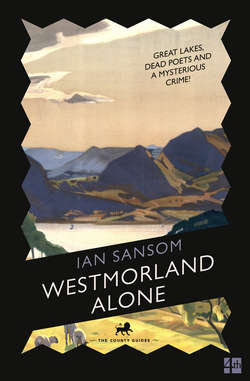Читать книгу Westmorland Alone - Ian Sansom - Страница 11
CHAPTER 4 PANDAEMONIUM
ОглавлениеIT WAS THE MOST VIOLENT COLLISION. There was a moment’s shudder and then a kind of cracking before the great spasm of movement and noise began. I fell forward and struck my head on the luggage rack. I was momentarily stunned and knocked unconscious.
When I came to I found we were all tilted together into a corner of the carriage – me, the mother and the baby. Our coach seemed to have tipped to the right, off the tracks, and become wedged against an embankment. What were once the sturdy walls of the carriage were now buckled and torn like the flimsiest material: the wood was splintered, the cloth of the carriage seats split, everything was broken. I remember I shook my head once, twice, three times: it was difficult to make sense of what had happened, the shock was so great. The first thing I recognised was that the mother and baby were both crying loudly – though thank goodness they appeared to be unharmed – and that the carriage was shuddering all around us, shaking and groaning as if it were wounded.
‘Are you OK?’ I said.
The woman continued crying. Her face was streaked with tears.
‘Are you OK?’ I repeated.
Again, she simply sobbed, the baby wailing with her.
‘We must remain calm,’ I said, as loudly and authoritatively as I could manage, above the sounds, trying to reassure both them and myself, willing them to be quiet.
‘Where’s Lucy?’ she said.
Where was Lucy?
I stood up, still rather disorientated and confused.
‘I don’t know—’ I began.
‘You have to get us out!’ said the woman, between sobs. ‘I have to find Lucy.’
‘OK,’ I said. I was still gathering my thoughts, trying to work out what to do.
‘GET US OUT!’ yelled the woman, suddenly frantic. ‘I have to find my daughter! You need to do something.’
I didn’t know what to do.
‘You need to do something!’ yelled the woman again. ‘Help us!’
The carriage continued to rock and sway all around us; clearly, we had to get out.
I looked around: the window was open to darkness and the tracks beneath us.
‘What’s under there?’ cried the woman. ‘Is Lucy under there? Lucy! Lucy!’ She did not wait for a response – she was hysterical. ‘Lucy! Lucy! Lucy!’
‘Look!’ I said. ‘You just have to let me check that everything is safe.’ I was worried that Lucy might be trapped beneath our carriage.
‘Lucy!’ wailed the woman.
‘Let me check if it’s safe!’ I said. ‘And we’ll find Lucy and we’ll get out!’
The shuddering and moaning of the carriage suddenly stopped and the baby paused in its crying and the woman looked at me as though having just woken.
‘You must stay here,’ I said, more calmly. ‘Just for a moment. I have to check if it’s safe. Do you understand? And then we’ll get out together.’
She looked at me, terrified.
‘Don’t leave us here!’ she said.
‘I’m not leaving you here. I’m just going to check that there’s a way out through the window and underneath the carriage and then—’
‘Take my baby!’ she said.
‘What?’
‘Take my baby with you and make sure he’s safe. I’ll wait here for Lucy.’
‘Look, if you just wait here for a moment—’ I began.
‘You’re not leaving us here!’ said the woman. ‘You take my baby and you look for Lucy and I’ll wait for her.’
‘But—’
‘You! Take the baby!’ she cried. ‘And you make sure he’s safe. And then you come back for me and Lucy.’
She was confused. She thrust the sobbing child towards me. I had no choice but to tuck him under one arm and crawl down with him through the window into the darkness underneath the train. If I got the baby out I could get the mother out. And then I could find Lucy.
Everything was wrong. It was dark, chthonic. There was a smell – a horrible sort of combination of hot metal and coal and oil and damp earth. I was breathing fast. It was as though we were being born. I made my way carefully with the baby underneath the carriage and across the tracks – I remember the rails somehow being greasy, with oil? – and then up into the light.
It was the most incredible sight: coaches were slewed across the tracks, rails were bent and twisted into terrible shapes, giant sleepers uprooted, the ballast ploughed through and scattered, and thick black smoke was everywhere. Passengers were emerging from their carriages and there were men running down the line towards us from up ahead. But what do I remember the most and the most clearly? It was the sound: the sound of birds singing. It seemed impossible, impossible that they could be heard above the din of breaking glass, and of grinding mechanical noises, and the rushing of flames, and the terrible cries of injured people, but there they were: birds, singing. It was like Spain, again. I deliberately took deep, deep breaths, trying to steady my nerves – and was struck suddenly by another smell, some sickening, thick, horrible smell that somehow I didn’t recognise.
I ran a few yards with the baby heavy in my arms. Now I could see the full length of the train: it looked like a buckled toy, as though having been tossed up and destroyed by some malevolent child. Up ahead was Appleby Station, with its proud sign and its fine passenger footbridge and over to my left were the station’s stables and cattle pens, the sound of the innocent animals joining the cacophony. And fire – fire was quickly spreading through the carriages, some of which had shattered entirely, stripped back to their thin pale wooden frames. It was a graveyard scene. It was pandaemonium.
